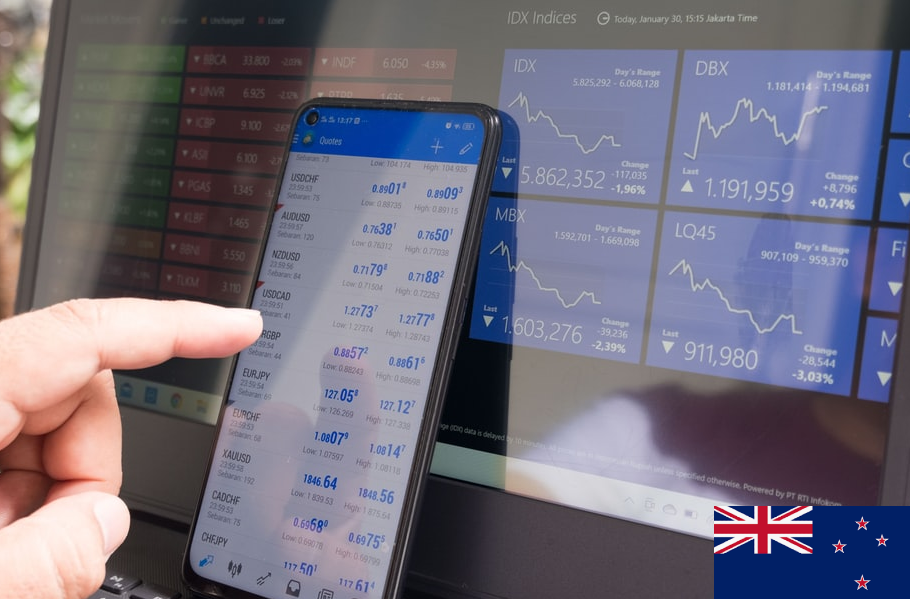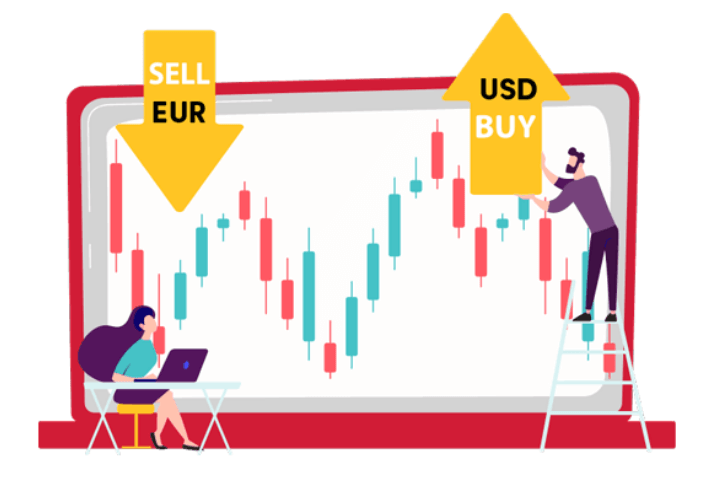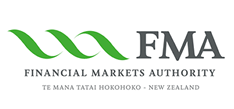Forex is an acronym for Foreign Exchange. It involves buying and selling foreign currencies and can take place online or offline. However, the online version is more popular. You will need a lot of money to start Forex trading offline, but you can start an online version with very little money. This is why people from across the globe can venture into it, including people from New Zealand. Forex trading NZ is similar to what you can ever find in any part of the world.
When you trade Forex, you will be doing so alongside hedge fund managers, full-time FX traders, and major investment banks. These individuals are the major decision-makers in the Forex market. This is because they have a lot of money to invest in Forex trading. They can, therefore, turn things to work in their favor.
Best NZ Forex Trading Brokers
How to Trade Forex in NZ
If you are a small-time Forex trader in New Zealand, you may find yourself at the mercy of these big-time traders. The only option is to learn how the big traders trade and adopt their methods. Once you can do this, making money from Forex trading will not be a problem for you at all.

Forex trading can help you make money, but money-making is not a 100% thing. There are times you will record losses too. An individual desiring to venture into Forex trading must never see it as a get rich quick. The secret to making money from Forex trading in New Zealand is to record more profit than losses. The losses will surely come, and there is nothing you can do about that. If your profits are more than your losses, you can make a profit.
Facts to bear in mind

You must bear in mind certain things before you venture into Forex trading in New Zealand, and we will show you some of these things in the remaining part of this write-up.
- Forex trading is not a get-rich-quick scheme. You can make money from it, but not as rapidly as many Forex trading tutors want you to believe. Forex trading is never a way to earn money quickly online. Earning money from Forex trading will take some time.
- Forex trading is not easy. It requires that you consistently read and learn how to trade. Learning is a continuous thing in the Forex market. The Forex market is highly dynamic. The knowledge you had yesterday may not be able to make you profit today. So, you need to keep on learning. Not to worry; loads of materials can teach you Forex trading even for free out there today.
- Before becoming successful in Forex trading NZ, you need to develop a working strategy. It would help if you never started trading live until you perfected the strategy. This can take years of practice before successfully developing a working strategy. It will also require a series of ups and downs. No matter how seemingly good your strategy may be, it can never give you a 100% profitable signal. There is no holy grail Forex trading strategy anywhere; you must never forget this. If anyone tells you otherwise, the person is only deceiving you.
- Not everyone can trade Forex. Before you can be profitable in Forex trading, you must be able to handle the emotional aspect of things. Trading with a demo account may not ignite any emotion, but the case changes when you trade with real money. If you cannot overcome the emotion involved in Forex trading, then you have no place in the Forex trading world. It is good to have a working Forex strategy, but it is not enough. Aside from a strategy that works, you also need an emotion management strategy that works. If you cannot handle the emotion of seeing your money gone, you should never trade Forex in New Zealand.
- You should only risk what you can afford to lose in Forex. It is not wise to borrow money for Forex trading; the risk involved is too much to permit that. Studies show that a more significant percentage of Forex traders lose money to Forex trading. The general review says only about 5% of traders record profit in Forex trading. You should, therefore, proceed carefully when trading Forex.
The points above do not discourage you from trading Forex, but you must note lest you make mistakes while trading Forex from opening your eyes to some points. The points above also highlight the importance of studying before you venture into Forex trading. Adequate knowledge will help to reduce the losses and increase your profit.
Additionally, avoid Forex trading schemes promising huge profits since many of them will result in huge losses that can make you go bankrupt. Avoiding such schemes will protect you from frauds, scams, and significant losses.
How Forex trading works
Forex trading NZ involves the buying and selling of currencies. The currencies are always in pairs too. Examples of currency pairs are:
- EUR/USD
- NZD/USD
- NZD/AUD
Before you can make money from Forex trading, you need to correctly predict the direction where your preferred currency pair will move. You need to predict the one that will move against the other between the two pairs and determine where the appreciating or depreciating one will go. When one currency appreciates, the other one will depreciate. When you buy one of the pairs, you are automatically selling the other.

Take NZD/USD, for example. If you predict that NZD will rise, you predict that the USD will fall against NZD. The first currency is the base currency in a currency pair, and the second one is the quote currency.
If the currency pair moves in the direction you predicted, your prediction will result in a profit. If the currency pair moves in the opposite direction, you will record a loss.
Essential terms in Forex trading

Before you can be successful in Forex trading NZ, there are some very important terms that you must know. Some of them are margin, swaps, spreads, commissions, leverage, etc. we will define each of these terms below:
Forex trading terms
As a Forex trader, you must learn as many of the terms as possible to help you better understand how the Forex market works. The various Forex trading NZ is easy to understand too. Check below for some of them.
- Pip: It is considered the lowest increase in the currency pair of concern price. It is a yardstick for measuring price movement in the Forex market.
- Bid price: This is the price at which the broker or market maker desires to buy the particular currency pair.
- Ask price: The price at which the broker or market maker desires to sell the currency pair.
- Spread: The difference between the bid and ask prices or the buy and sell process. It is made available to traders on the Forex trading platform by the broker. A broker that offers a lower spread than other brokers to its customers wants its customers to make more profit from trading the particular currency pair featuring that lower spread.
- Base: The base currency is the first currency in a currency pair. In USD/NZD, for example, USD is the base currency.
- Quote: This represents the second currency in a currency pair. In USD/NZD, NZD is the quote currency.
- Leverage: Leverage gives the Forex trader access to a larger amount of money. It enables the Forex traders to open trading positions bigger than what their account balance can accommodate. The extra money needed comes from the broker. The broker lends the money to the trader for the trade duration. If your leverage is 1:50, it allows you to open a position of $10,000 using your meager account balance of $200 (200 x 50). A leverage of 1:50 magnifies profit or loss by 50.
- Bear market: A bear market is a currency market that is falling or selling. If USD/NZD is selling, we say it is bearish.
- Bull market: It represents a Forex market that is rising or buying. If USD/NZD is buying, we say it is bullish.
- Broker: A broker offers the platform for the individual into Forex trading NZ to trade the Forex market. The broker acts as the go-between that connects the trader to the financial institutions offering access to the Forex market. The trader carries out transaction execution on the platform offered by the broker.
- GDP: It is the abbreviation for Gross Domestic Product. It represents the total sum of all the economic activities in a country.
- Inflation: It is the rate at which goods and services increase in price in a country
- Interest rates: This is the interest rate on money lent from credit providers like banks. The interest rate is usually under the central bank’s control and determines the strength or weakness of a given currency.
- Forex volatility: It represents the fluctuation level of a given currency pair. It also indicates the measure of the unpredictability in the currency pair’s price movement. Forex volatility tells about the risk or safety of a currency pair to the Forex trading NZ.
- Stop-loss is a market order used by the trader to close a losing position. The market order is activated once the market reaches the particular stop-loss price.
- Take profit: It is a market order for closing a trade in a profitable position. The market will automatically close once it reaches the take-profit price.
- Fundamental analysis: It is a Forex trading strategy relying on analyzing political and economic data for predicting the future direction of a currency pair.
- Technical analysis: It is a Forex trading strategy that relies on analyzing chart patterns to determine the future direction of a currency pair.
- Major pairs: You can also call them Majors. They comprise a list of the most traded currency pairs in the Forex market. They make up the largest share of the Forex market and are also traded and priced in the USD.
- Minor pairs: You can also call them Minors. They represent currency pairs that are not as heavily traded as the Major pairs. The minor currency pairs do not record as much liquidity as the major ones. You can refer to them as Exotic currency pairs.
- Cross-currency pairs: You can call them Crosses. These are currency pairs that do not contain the USD. Good examples are AUD/JPY, EUR/CHF, EUR/GBP, etc.
The terminologies above are just a few of the many terminologies you need to be aware of as a Forex trader in New Zealand. There are many more terminologies than the ones above, and you will learn many of them as you proceed with your Forex trading activities.
Bear in mind that not all the terminologies mentioned above may be relevant to you. You will find some of them to be more relevant than others. Their relevancy depends on the particular currency pairs you are interested in. it will also depend on the type of trade you execute.
How to trade Forex as a beginner
 As a beginner, learning to trade Forex can be very tough. However, we will open your eyes to what you can do in the remaining part of this write-up to enable you to trade Forex and grow over time. Bear in mind that your experience and capability as a Forex trader will grow with time.
As a beginner, learning to trade Forex can be very tough. However, we will open your eyes to what you can do in the remaining part of this write-up to enable you to trade Forex and grow over time. Bear in mind that your experience and capability as a Forex trader will grow with time.
- Open a Forex trading account: To trade Forex as a beginner, you will need first to open a Forex trading account. You can do this on a broker’s platform. There are so many Forex trading brokers that accept New Zealand traders. Some brokers will give you places to both live and demo accounts for free, while some brokers only give you access to their demo trading platform after you have deposited money to your live trading account.
- Research the various Forex pairs: You need to determine the currency pair to trade before you start trading Forex. The number of Forex pairs varies from one broker to another. As a beginner, it is advisable to focus only on one currency pair. You can now increase the number of currency pairs you study and trade as your level of experience increases. Depending on the one you find comfortable, you can study the currency pair of your choice via fundamental or technical analysis. Some traders can use both forms of analysis to study currency pairs.
- Make trading decisions: After studying the currency pair of your choice, it is time to place a trade. If the outcome of your analysis predicts that the currency pair will rise, you should consider buying the currency pair or going long. If your analysis says the currency pair will fall, you should consider selling that pair or going short. As a beginner in Forex trading NZ, you should not start trading on a live account. Instead, it would be best to focus on demo trading for now. You can move to live trading after gaining adequate confidence and perfecting your Forex trading strategy.
- Always follow your strategy: Before you start trading Forex, you need to develop a working Forex trading strategy. Make sure the strategy is profitable. You can determine its profitability by using a demo account and backtesting. If the backtest result comes out positive, it is time to start using the strategy. No matter what happens, always stick to that strategy. Changing from one strategy to another midway is one of the major causes of consistent loss in Forex trading. When you switch indiscriminately from one strategy to another, it can cause you confusion, preventing you from learning anything tangible as a Forex trader.
- Place your first trade: This is not a difficult thing to do. Forex trading platforms are usually similar in design. After your strategy has told you what to do, it is time to place the trade according to the dictates of the strategy. Make sure to include the take profit and stop loss price points for the trade. This will help you to manage your money better. The most common money management strategy when placing trades is in a ratio of 1:2 or 1:3. If your stop-loss is 5 points, for example, your take profit will be 10 points in 1:2 and 15 points in 1:3.
- Close the trade: If the trade goes according to what you predicted from your strategy, the trade will hit your take-profit and make you some money. If the trade goes against your prediction, on the other hand, it will hit your stop-loss and give you some losses. Whatever the case may be, your money management strategy will help to cut down the loss considerably. No matter the outcome of the trade, you should reflect on it to know where you go wrong and how to improve. This will help you get a better result next time or boost your confidence when placing future trades in Forex trading NZ.
Forex trading strategies

As a beginner in Forex trading, you need to develop and follow a working strategy. Failure to do this can cause you to lose the money in your account fast. There are many types of Forex trading strategies that you can adopt as a beginner in the New Zealand Forex trading market.
The time frame you use can also determine the strength of the Forex trading strategy. The general idea is that most Forex strategies work better at higher time frames. Before you start using any Forex trading strategy for live trading, you should try it out on demo trading.
You should also back-test the strategy to help you determine its percentage profitability. Testing a demo account strategy will help you determine its sustainability. You can also find many valuable indicators on Forex trading platforms, and the indicators can help you determine your entry and exit points.
Some Forex traders use multiple strategies, while others only focus on one. It all depends on your level of knowledge in Forex trading. We will open your eyes to some of the common strategies in the remaining part of this write-up.
Scalping
This is a very common Forex trading strategy adopted by many Forex traders in New Zealand. Many beginners adopt this strategy. The traders open several positions at the same time for a short period. They wait until the multiple opened positions are in profit and then close all of them.
The small profits from the multiple positions can amount to a lot of money. The strategy is based on technical analysis. Before you can use the scalping strategy, you must be able to commit a lot of time to trade each day.
Day trading
This strategy allows traders to enter and exit trades at least once a day. Such traders make sure they close their open positions before the end of the day. This way, they can avoid paying overnight holding costs or swaps.
Scalping is a fast-paced trading strategy. Those who are not comfortable with scalping can go for day trading, which is not as extreme. Just make sure to choose a top day trading platform first. Day trading is not as extreme as scalping, but it is a short-term trading strategy like scalping.
Swing trading
If you are looking for a Forex trading strategy that balances both technical and fundamental analysis, this is the best strategy to choose. Traders using this strategy can open their trading positions for many days on end.
They focus on buying a currency pair at swing lows and selling it at the swing high. Analysis of this type of market requires a short period, and the trader will usually leave trades running overnight. So, such traders will have to pay a swap fee. Experienced Forex traders are the ones that usually use this strategy.
Position trading
This is another popular strategy in Forex trading NZ. Traders using this strategy will leave their positions open for a very long time and ignore short-term fluctuations in price. If you have a lot of time on your hands for market analysis, this Forex trading strategy will work perfectly. It is a good strategy for those using fundamental analysis.
How to pick a good broker
Your ability to make money from Forex trading depends significantly on the Forex broker you work with. This is why you must choose your Forex broker carefully. It is one thing to have a good strategy for Forex trading and another thing to execute the trades on the right Forex trading platform.
Some brokers are known to manipulate the trades against the traders, making the latter lose their investment. This section will show you some of the many important things to bear in mind when choosing a Forex broker among the many accepting New Zealand traders.
Check for regulation
Before picking any of the Forex brokers available to New Zealand traders, check if the broker is regulated. A regulated broker will have a very good reputation, and you can trust such a broker for Forex trading NZ. Before registering with that Forex broker in New Zealand, find out if it is authorized by the Financial Markets Authority (FMA), which is responsible for regulating Forex brokers in New Zealand. If this body does not regulate the broker, you should look elsewhere for another broker.

To know if the FMA truly regulates that broker, check if the FMA registration number is listed on the broker’s website. You can also visit FMA’s website (fma.govt.nz) to list authorized brokers for New Zealand Forex trading.
Check the available account features
One other important consideration is the kind of account that the broker offers. Check all the features available in that account to determine how much value you can get. Each of the Forex brokers offers different account types and offerings.
Check the available leverage for the account and the commissions you have to pay to operate the account. Also, check the spread and the initial deposit. Do not forget to check if the deposit and withdrawal methods are easy on the platform.
- Leverage: The leverage differs from one Forex broker to another. It can also differ among the available Forex trading accounts. Some brokers only offer 1:50 leverage, while it can be as high as 1:500 on some other brokers. If you are in profit, the leverage will be in your favor. The reverse is the case if you are at a loss. You should always use leverage with care since it is a two-edged sword. It can make or mar the funds in your Forex account.
- Commission and spreads: The commission and spread determine the cost of Forex trading on the broker’s platform. The commission and spread differ from one broker to another. The spread on some currency pairs may also be higher or lower than those on others. Some Forex brokers offer zero commission services to help the trader save some money, ensuring the trader pays no commission to trade Forex on the platforms. However, those brokers charging no commission usually make up for it by increasing their spreads.
- Initial deposit: As a beginner in Forex trading NZ, you should not risk too much money. One of the rules of thumb in Forex trading is never to risk what you cannot afford to lose. To help you reduce your risk, you should look for a broker that does not demand a huge sum as an initial deposit. While some brokers can demand a four-figure initial deposit, others can charge a small amount of money. The initial deposit on some brokers can be $500, $250, $100, $50, or even $10. Some brokers require as small as a $1 initial deposit. Find out what the requirements are on that broker before you register there.
- Depositing and withdrawing: The ease of depositing and withdrawing money on that trading platform is also an important consideration before registering an account there. Check if the broker offers multiple payment methods. A good broker should support card payments, bank transfers, and even e-wallet payments. Some of the most common payment methods on the Forex trading platform in New Zealand are credit card payments, wire transfers, personal or business checks, PayPal, etc. In most cases, you can use the method you deposit money to withdraw your money on the platforms.
Check the currency pairs
It is essential to check the currency pairs available on the broker’s trading platform before registering there. The number of currency pairs differs from one broker to another.
The principal thing is to check if the Forex broker offers the particular currency pairs you are interested in. You should equally find out if the broker offers currency pairs with high liquidity. Some of the important currency pairs to look out for are:
- EUR/USD
- GBP/USD
- USD/JPY
- USD/CHF
Quality of customer service
You must never overlook this point when choosing a Forex trading platform in New Zealand. If the customer service is poor, you should look for another platform. It should be easy to communicate with the customer care agents via various methods, including email, live chat, and phone calls. The customer care agents should also respond to the customers’ questions very fast and provide helpful answers to the questions.
Best Forex Trading Platform NZ
Most Forex brokers accepting traders from New Zealand offer MetaTrader 4 trading platform, and many of them also offer MetaTrader 5 (MT5) platform. Irrespective of the types of platforms available, check if there is a good supply of fundamental and technical tools on the platform before you register there. The tools can assist the traders in Forex market analysis.
Additionally, do not forget to check the customization options available on the Forex trading platform. Some websites can come with strategy builders to help the traders build their own strategies. Does the site come with back-testing features too? You can even get a trade alert feature on some other trading platforms.
Forex Trading NZ FAQs
Is it right to borrow money for Forex trading?
No, it is not right. One of the rules of thumb in Forex trading is to only risk what you can afford to lose.
Can I make money from Forex trading in New Zealand?
Yes, you can make money from Forex trading in New Zealand. However, you need a lot of knowledge to make this possible. While it is possible to make money from Forex trading in New Zealand, also know that Forex trading is not a get-rich-quick scheme. So, do not expect to make a six-figure income from it after your first few trades.
How can I develop a working Forex trading strategy?
You need a lot of studying to develop a working strategy in Forex trading. You also need to determine if you want to use a fundamental analysis-based strategy or a technical analysis-based strategy.
After developing your trading strategy, it is time to try it out on a demo account. You should not start using the strategy for live trading until you have perfected it. How can you know if your strategy is perfected? You will know if you start recording a regular profit from demo trading for a long time.
Conclusion
From the information above, you would have learned a lot about how to trade Forex in New Zealand. Forex trading NZ is not a walk-in-the-park endeavor. You must be ready to put in the work before getting the benefits. The tips we gave above should get you started, but you should also know that there is no end to learning in Forex trading. Your performance and profitability will improve if you keep on learning without stopping.
Never trade Forex with money you cannot afford to lose and always practice on a demo account before you start trading.









